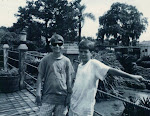By popular request (meaning I got a text from my moms about it), I have decided to write about a non-musical theme. The recent deaths of Howard Zinn and J.D. Salinger created a stir this week. However, I was surprised by how much praise Salinger received, overshadowing a discussion of Zinn's body of work. For example, the New York Times online version had a lead story about Salinger, while Zinn showed up only in the obituaries section. People who did pair them together, as in friends' facebook status updates, did so in a manner that made them seem compatible. I strongly disagree with this assertion.
First, J.D. Salinger.
I was required, like almost everybody in the US, to read "The Catcher in the Rye" for school. I thought it was god-awful. I never understood why a book about a disaffected adolescent from a privledged background who decides to wander around New York City after being expelled from prep school got so much praise. It just never seemed like that great of a book to me, neither the quality of writing nor the narrative impressed me. I think it ranks a distant third or fourth in an outdated genre of books about young (male) protagonists struggling to find a place while fighting the establishment (as they said back then), father figures, each other, and life's daily tragedies (everything's dramatic when you're 15). For example, "The Outsiders," "Lord of the Flies," or 'Great Expectations" fit this mold, but each presents us with some sort of moral issue in comparison to Holden's distant infantilism. These are all books that I think teachers and administrators though it would be good for us kids to read and learn valuable life lessons, while, as Howard Zinn might comment, the more valuable lessons came from the defunding of education and social welfare, the militarism displayed by nuclear posturing and the war on drugs, and the misinterpretations and erasures of significant cultural contributions and historical facts in daily classroom interactions. As my seventh grade social studies teacher once said, the Civil War was not about slavery at all (States Rights!). The commentaries about Salinger almost uniformly compared Catcher to another great American novel, Mark Twain's "Huck Finn," but I think if Huck ran into Holden in the street, he might tell him to stop whining about everybody being phony or wallowing in pity and actually leave the prison of his psyche to do something truly adventurous or heroic, like, say, helping a slave escape down river, or having fun playing adults for the fool.
Second, Howard Zinn. A popular historian in that many people read his work, he wrote history that anyone could understand, and that he eschewed the 'great man' theory of history to talk about ordinary peoples' lives. As someone who has read a lot of history books ( I was a history major in college), Zinn hit the important stuff, but in the interest of making his work accessible often left out some of the nuance and sidebars of US history, for better or worse (you decide). His was an anti-imperialist, anti-racist reading of history that paid attention to class struggles and revealed many of the erasures wrought by attempts to present a teleology of American world supremacy. Zinn, much like Studs Terkel, believed in giving ordinary people a voice and inviting them to participate by telling their own stories.
But perhaps most telling is Zinn's public life; he decided to actively participate in the struggles of his time, while Salinger turned inwards. While Zinn's life remains an open book, we may never know why Salinger became a recluse, perhaps this is why people obsess. I continue to be unimpressed.
Subscribe to:
Post Comments (Atom)


I have to say that while I respect your opinion in this matter, I think that you are wrong to dismiss Salinger and Catcher in the Rye. Like most art, it is hardly necessary for a novel to have an uplifting moral to be considered important. I've noticed this kind of character judgement more and more towards writers especially. Music too of course. Anyone who achieves something and is in the public eye has to pass some kind of character test and if they fail even their achievements can be negated by bad personal behavior. Luckily in the visual arts, "bad boys' are still perversely admired. As they should be. If every novel had a moral we approved at its base I know I would be disapointed and bored. I'd need to put my books away and go out and make trouble. Be rude and selfish.
ReplyDeleteI love your blog. What are we going to talk about next?